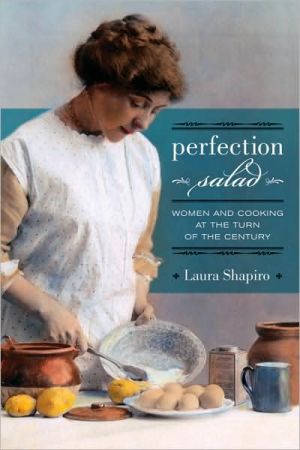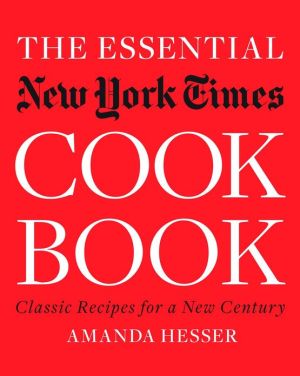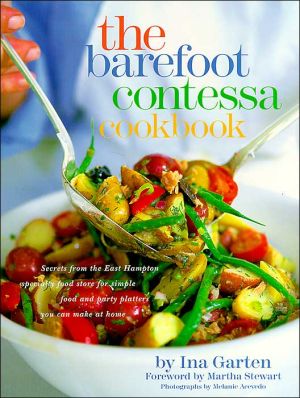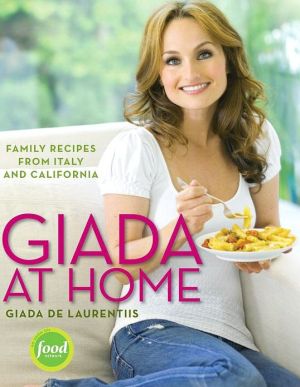Perfection Salad: Women and Cooking at the Turn of the Century
Toasted marshmallows stuffed with raisins? Green-and-white luncheons? Chemistry in the kitchen? This entertaining and erudite social history, now in its fourth paperback edition, tells the remarkable story of America's transformation from a nation of honest appetites into an obedient market for instant mashed potatoes.\ In Perfection Salad, Laura Shapiro investigates a band of passionate but ladylike reformers at the turn of the twentieth century—including Fannie Farmer of the Boston Cooking...
Search in google:
"Shapiro recounts the story of scientific cooking with a deft humor some might find unbecoming to a work of impeccable scholarship. Yet how else are we to think about a movement that upheld mayonnaise, cream sauce, and the extended boiling of vegetables as cures for every social ill, from drunkenness and degeneracy to feminism and labor unrest?.... My only disappointment with Perfection Salad is that it ends too soon." —Barbara Ehrenreich, New York Times Book Review"A comprehensive, droll social history of a curious women's movement that's responsible for everything from nutritional education programs to TV dinners."—Maureen Corrigan, Village Voice Publishers Weekly A journalist who has written extensively on aspects of feminism, Shapiro presents a well-researched history of women as nutritional revolutionaries during the late 19th and early 20th centuries. This serious study is lively entertainment, spiced by the author's wit and wry perceptions. Through her, we discover clues to the motives of women who turned American kitchens into laboratories, run according to the dicta of the Boston Cooking School and similar establishments that proliferated across the country. The most memorable of the culinary movers was Fannie Farmer, whose cookbook was published in a modest 3000-copy edition in 1896. Stories about Farmer and other domestic scientists of the period add strong appeal to Shapiro's report. So do the parallels between early feminists and today's advocates of equal rights. It is somber to realize, as the author emphasizes, that fear of significant power for women ``even over themselves'' kept their aims restricted. By 1900, they had settled for the status of experts in home economics instead of independence. (March 3)
Prologue: Toasted Marshmallows Stuffed with Raisins31Drudgery Divine112And the Kitchen Becomes the Workshop of the Skies343Better Ways, Lighter Burdens, More Wholesome Results474Perfection Salad715The Mother of Level Measurements1066Whoever Knew a Dyspeptic to Be a Christian?1277Foes in Our Own Household1698An Absolutely New Product191Conclusion: A Leaf or Two of Lettuce217Acknowledgments238Notes239Bibliography263Index275
\ From Barnes & Noble"Q. Are vegetables ever served at a buffet luncheon? A. Yes, indeed...provided they appear in a form which will not look messy on the plate.... Even the plebian baked bean, in dainty individual ramekins with a garnish of fried apple balls and cress, or toasted marshmallows, stuffed with raisins...." \ This advice, published in a popular cooking magazine in 1923, illustrates what happened to American cooking when well-meaning cooking teachers took up the domestic science banner, introducing "businesslike principles" to home management.\ Laura Shapiro's insightful and amusing social history is full of such anecdotes. She documents the birth of domestic science, the movement that launched a million home economics courses and encouraged the overuse of white sauce, the invention of TV dinners, and the packaging of salads in Jell-O.\ She vividly portrays such teachers as Fannie Farmer, "the mother of level measurements," and Ellen Richards and her Woman's Laboratory at Massachusetts Institute of Technology, which taught Hygiene, Bacteriology, Foods, and Laundry Work. Another eminent teacher, Mrs. Lincoln, even devised a special scent-free menu of baked bean soup, dry toast, and stewed raisins for Tuesdays (the day after washday), so that clean clothes would not pick up cooking odors immediately.\ As Shapiro sees it, "They chose domesticity as a way of getting out of the house, and food as a means of transcending the body. But they carved out an identity for women so powerful that we're still trying to clamber out of it, and their influence on American cooking was devastating."\ Perfection Saladhas been republished as part of the new Modern Library Food series with an introduction by Jane and Michael Stern. (Ginger Curwen)\ \ \ \ \ \ Publishers Weekly - Publisher's Weekly\ A journalist who has written extensively on aspects of feminism, Shapiro presents a well-researched history of women as nutritional revolutionaries during the late 19th and early 20th centuries. This serious study is lively entertainment, spiced by the author's wit and wry perceptions. Through her, we discover clues to the motives of women who turned American kitchens into laboratories, run according to the dicta of the Boston Cooking School and similar establishments that proliferated across the country. The most memorable of the culinary movers was Fannie Farmer, whose cookbook was published in a modest 3000-copy edition in 1896. Stories about Farmer and other domestic scientists of the period add strong appeal to Shapiro's report. So do the parallels between early feminists and today's advocates of equal rights. It is somber to realize, as the author emphasizes, that fear of significant power for women ``even over themselves'' kept their aims restricted. By 1900, they had settled for the status of experts in home economics instead of independence. (March 3)\ \ \ Library JournalIn documenting the history of the American domestic science movement at the turn of this century, Shapiro's very readable book helps explain why middle-class Americans developed a preference for a cuisine that sacrifices taste to the pure and the plastic. It was an era when science was in ascendency, and the leaders of the domestic science movement hoped to change the eating habits of the nation and to do away with the irrational methods of traditional housekeeping. How these women succeeded and where they failed is a fascinating story. A good bibliography nicely supplements this admirable book, which should appeal to a wide audience. Highly recommended. Joyce S. Toomre, Russian Research Ctr., Harvard Univ.\ \ \ \ \ Nach WaxmanDazzling may be an odd word to use about a work of social history, but dazzling it is. Laura Shapiro's gimlet-eyed exploration of the roots of modern home cooking in America offers utterly fascinating research, analytic acuity, wit, pace, and writing so exhilaratingly good that it's sometimes hard to remember what an important book this is. Three cheers for this classic. Entertaining, and it's good for you. What more could we ask?\ —Owner, Kitchen Arts and Letters\ \ \ \ \ Richard SazHow good to see this worthy book in print again. And how rare a writer is Laura Shapiro-she has synthesized an immense amount of research through the lens of her own crystal-clear thinking (and not incidentally her sly humor). Along the way: white sauce as purifier and ennobler, color-coordinated menus, Crisco as sandwich spread (!), "Dainty Desserts for Dainty People," home economics as agent for keeping "the male world male." This book is a pleasure to read. Welcome back, Perfection Salad. \ — author of Classic Home Desserts\ \








